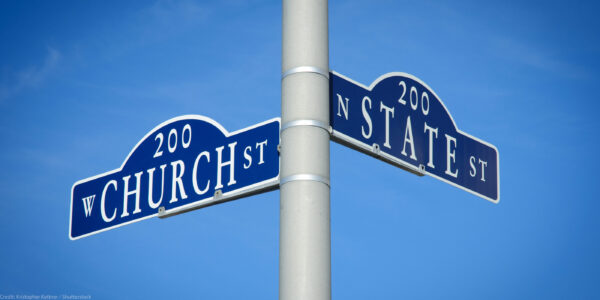ACLU Asks Chesterfield County Schools to Steer Clear of Controversial High School Bible Course
Craig County public schools decided against same course after ACLU objected
FOR IMMEDIATE RELEASE
CONTACT: media@aclu.org
Chesterfield County, VA — The ACLU of Virginia has asked the Textbook Review Committee of Chesterfield County Public Schools to drop from consideration a controversial Bible study course that may unconstitutionally promote religious beliefs in public schools.
The course, entitled The Bible in History and Literature and produced by the National Council on Bible Curriculum in Public Schools, was the target of an ACLU lawsuit in Texas in 2007 that resulted in a local school board agreeing not to use it. In 2008, the Craig County School Board proposed using the same course, but pulled it after the ACLU of Virginia objected. An earlier version of the course was struck down as unconstitutional by a Florida federal court in 1998.
"The ACLU does not oppose teaching about religion in public schools," said ACLU of Virginia Executive Director Kent Willis. "However, we are concerned that this course is not an impartial study of the Bible, but an attempt to advocate for one set of religious beliefs to the exclusion of others."
"It is hard enough to teach something as personal and deeply felt as religion in public schools without crossing the line dividing church and state," added Willis. "That is made doubly difficult when the curriculum itself encourages stepping over the line."
"The most important way we protect religious liberty is by keeping the powerful hand of government out of religion," said Willis. "Public schools must neither interfere with the right of students to follow their religions beliefs nor promote particular religious beliefs."
In court papers filed in the Texas case, the plaintiffs, who were parents of students, argued that The Bible in History and Literature is not a serious scholarly attempt to teach the Bible, but promotes a particular interpretation of the Bible that is not even shared by most Christians in the world.
A copy of the ACLU's letter objecting to The Bible in History and Literature course follows. It was faxed to the Textbook Review Committee of Chesterfield Public Schools by ACLU of Virginia Legal Director Rebecca K. Glenberg.
April 22, 2010
Via Fax: (804) 594-1682
Textbook Review Committee
Chesterfield County Public Schools
P.O. Box 10
Chesterfield, Virginia 23832
gayle_hines@ccpsnet.net
ed_witthoefft@ccpsnet.net
Re: High School Bible Course
Dear Textbook Committee Members:
I understand the textbook committee is currently considering texts for its upcoming high school class on the bible, and that among those under consideration is The Bible in History and Literature, prepared by the National Council on Bible Curriculum in Public Schools (NCBCPS). I urge you not to approve that particular text, which has serious constitutional flaws.
As you know, the Constitution does not prohibit public high schools from offering courses about religion. However, such courses must be carefully designed and taught to ensure that they present a scholarly, objective view of religion, and must not promote any particular religious viewpoint. The NCBCPS curriculum does not comport with these constitutional requirements.
Among other things, the NCBCPS curriculum presents the Bible from the perspective of Christianity in general, and a particular interpretation of Protestant Christianity specifically. For example, the curricular materials frequently instruct students that the New Testament fulfills prophecies contained in the Hebrew Bible (what the curriculum typically refers to by the Christian term "Old Testament") – as when the materials depict a letter in the Hebrew alphabet as the crucifixion, or describe Isaiah as foretelling the coming Jesus.
The NCBCPS curriculum also teaches the Bible as literal, historical truth. Students are asked, for instance, to answer true/false questions such as "Jesus was resurrected on a Sunday," study dated chronologies of Biblical events, and examine maps plotting locations such as the Garden of Eden and the Tower of Babel. In another example, the NCBCPS materials assume the literal truth of the creation account in Genesis, asking students, "If all living things had been created in a different order, how would it affect our world today?"
Because of these and other constitutional flaws, the ACLU sued the school board of Odessa, Texas to prevent the use of the NCBCPS curriculum. The case settled, with the school board agreeing that it would not use the curriculum in the future, and that any future Bible courses would adhere to strict legal standards for objectivity. Additionally, in 1998, a federal judge in Florida enjoined a public school from teaching an earlier version of the NCBCPS curriculum.
I therefore strongly discourage you from adopting the NCBCPS curriculum.
Should you have any questions, please do not hesitate to call me at (804) 644-8022. Thank you for your attention to this matter.
Sincerely,
Rebecca K. Glenberg
Legal Director

